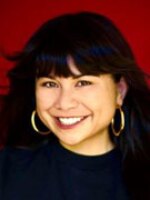On any given Wednesday night at the Allied Gardens Community Center, music echoes off the basketball court’s cement.
And in between verses of The Sugar Hill Gang’s “Rapper’s Delight,” the sound of women laughing pierces the air.
They’re all there to play the game Double Dutch, when two people swing two jump ropes and a person in between them jumps and dances to the beat. It’s a cherished childhood pastime with deep roots in Black culture, but these players are not kids.
The rule at San Diego’s 40+ Double Dutch Club is you have to identify as a woman and be over 40.
Setra Shields, the captain, started the club this past summer after she saw a viral Facebook video of the original 40+ Double Dutch group in Chicago.
“I looked at it and said, ‘Wait, where are these women? I need friends like this,’” she said.
She reached out to the original group in Chicago, learned how to start her own group and spread the word locally by posting about it on the Black San Diego Facebook page.
The response was immediate with more than 50 women contacting her in a matter of days.
Since then she’s developed a core group of 15 who regularly show up to play.
They're all 40 years old or older and proud of it. The numbers on the back of their club shirts represent their ages.

The formula is simple.
Each week, Shields, who is also a trained exercise instructor, leads the women as they play Double Dutch, hula hoop and African hopscotch. They also just dance.
“We don’t want to deal with men, with boyfriends, with husbands,” said Pamela Robinson, the founder of the 40+ Double Dutch Club in Chicago.
Robinson’s small group in Chicago has grown to more than 100 clubs around the world, including in Israel and Ghana. She said the interest shows the need for women to have a space of their own.
“At the age of 40 you do so much for other people. We’re always doing for other people and holding everything together for everybody else,” she said. “So we need time to just hold ourselves together.”
RELATED: People turn to exercise to prevent COVID's severe impacts
Double Dutch is good exercise, but in this all-women setting it’s also a place to recharge and heal from the hectic demands of daily life.
Rosa Barr Williams has been part of the group since the beginning. She didn’t know anyone before she joined the group, but now her fellow 40+ Double Dutch club members have become like family.
“I’ve had several horrible days, and if it wasn’t on a Wednesday when we do meet, it was one of my sisterhood in the back behind me,” she said, gesturing to her friends. “Wednesday is just the day we come together, but we’re there for each other, each and every week.”

Regina Dixon-Reeves joined the group when she moved to San Diego from Chicago in July. Shortly after moving, she had to undergo emergency dental surgery. She still didn’t know many people, so it was Barr Williams, her fellow jumper, who stepped in to take care of her.
“(Rosa) told me, ‘Girl, you are here by yourself, I’ll drive you, I’ll see about you, and I’ll make sure you are all right,’” she recalled. “If I hadn’t had this group, I wouldn’t have had that connection.”
In the midst of the pandemic, when so many have struggled with isolation, the weekly outdoor Double Dutch session offers these women a healing space to connect with each other and reconnect with who they used to be when they were children.
“For an hour, hour and a half, you get to just laugh and joke and be a kid again, be a Black girl,” said Dixon-Reeves. “And that is wonderful because…many of us Black girls grew up too fast and so this gives us a chance to revisit that.”






